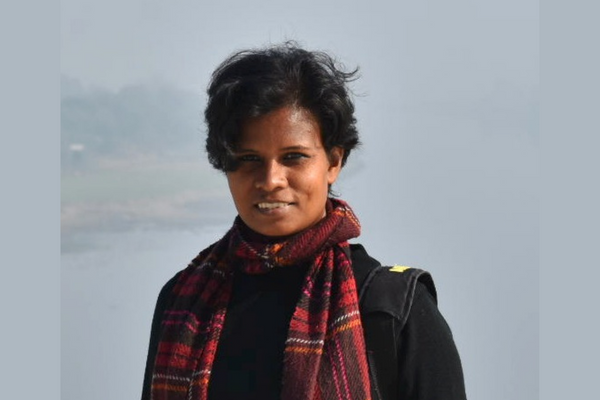
The South Asian Studies Initiative (SASI) and other co-sponsors (see below) will host a presentation by Jacinta Kerketta, an indigenous poet of India, where she will talk about the indigenous world of India through the eyes of poems. The event aims to engage the audience in themes related to indigenous literature, politics, and resistance. Jacinta will talk about the historical and contemporary situation of Adivasis (Hindi for "original inhabitants") in eastern India and read and discuss some of her poems.
Jacinta Kerketta is a poet, writer, and freelance journalist, belonging to the Oraon Adivasi community in Jharkhand. She writes in Hindi, and her work has been translated into English, German, Italian, and French, along with several other Indian languages. In her poems, Jacinta highlights the injustices committed on the Adivasi communities, along with their struggles. Her poems are also important cultural and artistic documents of Adivasi worldviews. She is the author of three full-length collections of poems – Angor ("Ember") (2016), Jadon Ki Zameen ("Land of the Roots") (2018), and Ishwar aur Bazaar ("God and the Market") (2022).
The Indian case has strong parallels to ongoing movements for indigenous sovereignty and rights in North America. For example, Adivasi communities in mineral-rich Jharkhand have been struggling for political sovereignty, since British colonization and leading up to state formation in 2000 and at present. In Canada and the US, there are parallels to indigenous movements such as Idle No More (2012) and at Standing Rock (2016), as well as increasing acknowledgement of indigenous dispossession that established land grant universities such as Ohio State.
This event aims to open this discussion of global indigeneity and contemporary struggles over land, livelihoods, and identity. Through the lens of history and Jacinta's poetry, we hope to have an interdisciplinary conversation that can strengthen our transnational and local understandings of indigenous life and futures.
This event is free and open to the public. Sponsored by the South Asian Studies Initiative, the American Indian Studies Program, the Department of Women's, Gender and Sexuality Studies and the Humanities Institute. For more information, email moriarty.8@osu.edu.
The Humanities Institute and its related centers host a wide range of events, from intense discussions of works in progress to cutting-edge presentations from world-known scholars, artists, and activists, and everything in between. In our current moment of riding the unpredictable currents of the pandemic, we reaffirm the value of in-person engagement. We strive to amplify the energy in the room. But we also recognize the need to be careful and the fact that not all our guests will be able to visit our space. We, therefore, will continue to offer Zoom access to all our events upon request. If you wish to have such access, please send your request to moriarty.8@osu.edu.
Some of Jacinta's poems are listed below (English translations by Bhumika Chawla D'Souza).
The Wait
They are waiting for us to become civilized,
While we are waiting for them to turn human
My Being An Adivasi
No sari, no braids in the hair,
No tattoos, no jewellery.
None of that you wear.
What kind of Adivasi we have there?
A question people ask me often.
This is what I would like to tell them:
To be with the Earth in close connection,
To live with mother nature in harmony and unison,
To flow like a river
And remain natural, pure, innocent,
To be in revolt against all fetters, without and within,
And, while wearing all symbols of beauty,
To be more human,
That is what it means to be an Adivasi.
But for minds that can only think
In terms of jewelry and tattoos on the skin
And fail to comprehend
What it truly means to be Adivasi,
to be of indigenous origin –
I wish, in these changing times,
To shatter anew all fallacies, all notions,
Falsely holding onto symbols and emblems.
This inherent indigeneity alone can preserve
One’s being an Adivasi on this earth.
For the Hills
Those selling out their integrity
For a few pieces of silver,
How would they comprehend ever,
Why some people lay down their lives
For the sake of the hills.
Where Nothing Reaches
People of the hills drink from streams and springs,
Government water does not reach there.
Nor does reach a school teaching in the vernacular
Or in hospitals any doctor,
Neither electricity nor the internet—
There reaches absolutely nothing.
So, tell me, Saheb! Where nothing reaches:
How does there reach so much poison
To kill one’s own fellow men
In the name of cow and religion?
